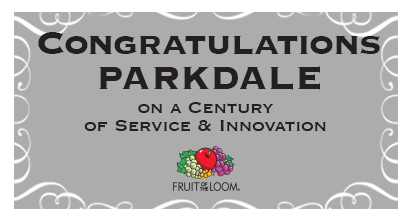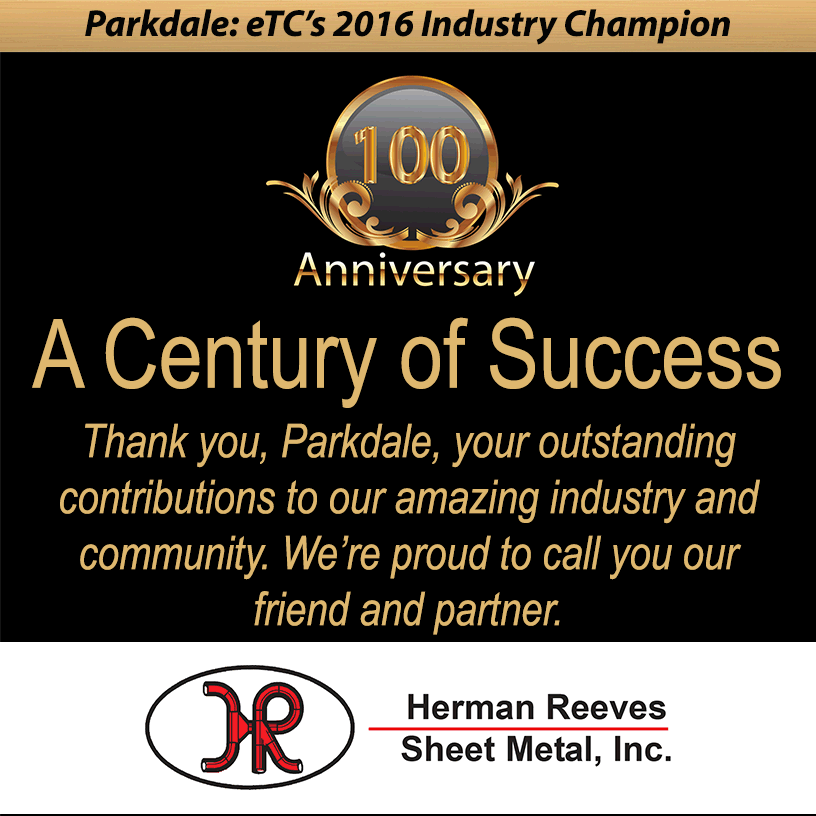
Posted December 15, 2016
By Devin Steele (DSteele@eTextileCommunications.com)
GASTONIA, N.C. – Less than a mile off I-85 here sits the corporate headquarters of the largest yarn-spinning company in the United States and one of the largest in the world.
Take a right onto Cotton Blossom Circle, and you can’t miss it: You’ll see the company’s large, boll-like logo strategically planted in the foreground 100 or so yards away from the office. And, if you’re positioned just right, that art sculpture forms a circular frame around the building, whose atrium also intentionally resembles a cone of yarn.
For 16 years, it’s been an awesome sight to behold each morning for a number of company leaders and corporate employees who have spent most of their careers helping build Parkdale into one of the textile industry’s most admired and venerable companies.
Just ask them. Without expressing those arriving-to-work sentiments exactly, company leaders eTC interviewed spoke highly of a company that has served them well and, just as importantly, served their customers and communities well. Each has a different experience, a different perspective, a different perception of the company and what makes it successful, but a common thread runs through each conversation:
Parkdale is home. Parkdale is family. Parkdale is Parkdale – uniquely Parkdale.
Which is probably why most of them have made Parkdale their last or only career stop.
Beyond their personal predilections, these leaders used a number of superlatives to describe the company: Quality oriented. Customer focused. Technology driven. Innovative. Forward thinking. Lean. And more.
Indeed, Parkdale seems to have thrived and survived by living by those tenets, and, wrapped together, you might be able to sum up Parkdale’s success in one phrase: pursuit of excellence.
That mantra was ingrained in the Parkdale psyche by longtime company leader and industry legend Duke Kimbrell (1924-2014), who worked part-time at the company starting at age 14 and, after military service and college, would lead the company for several decades. And it has been extended and in many ways augmented by Kimbrell’s son-in-law, Parkdale President & CEO Anderson “Andy” Warlick.
Parkdale is one of the largest single consumers of U.S. cotton. The company has depended on a large and diverse supply chain and customer base that has shared in the company’s success. Parkdale employs people in the U.S., Mexico, Colombia, Honduras and the Dominican Republic at 26 spinning facilities, a research center, warehouses and at corporate.
Parkdale uses airjet, Vortex, ring spinning and rotor systems to produce yarns, and is committed to industry-leading technologies, according to company leadership. And its commitment to state-of-the-art, quality monitoring systems, offline sample testing, conscientious attention to detail and cleanliness combine to guarantee a consistent yarn, they added.
Oh, and, shhh … don’t tell anyone – Parkdale leaders want to downplay this, for reasons explained later – but the company is celebrating its 100th anniversary this year. And, given the U.S. textile industry’s topsy-turvy ride on a rocky road for years, this is a momentous achievement.
Especially given that the company has grown and expanded during this precipitous industry decline.
As a standout of great measure that is quietly marking its centennial anniversary, Parkdale has been named eTC’s 2016 Industry Champion. While company leadership would prefer to look ahead rather than back, it’s necessary to explore certain attributes, the embedded culture of change and proactive decisions based on expected market disruptions that have put the company in a position to start its second century on solid footing.
Bucking ‘tradition’
Indeed, Parkdale isn’t one to toot its own horn, even in its 100th year, according to Warlick. He made his case to eTC after reluctantly agreeing to be spotlighted as eTC’s Industry Champion, which he called an “honor.”
“It’s 100 years but we’re not making a big deal out of it because we don’t want our team to be looking in the rearview mirror,” he said. “We want them looking towards the future. We want people focused on the future in an uninhibited way, not reliant on traditions. Sometimes, tradition inhibits progress because people will be afraid to change what is perceived as tradition or how we do things.’ ”
If anyone knows the potentially crippling effects of “tradition,” it’s Warlick. At 27, he left Milliken & Co. to join Parkdale. At Milliken, a company well ahead of its time in this industry, Warlick was learning and embracing many quality management and process improvement principles. And he often encouraged Kimbrell to implement some of these groundbreaking methods.
Kimbrell hired his son-in-law to bring those fresh ideas and knowledge to Parkdale. But trying to change some of the longtime company veterans was tough.
“You had the old guard saying, ‘son, that won’t work. I’ve been in this business for 30 years and we tried something like that before and it didn’t work,’ ” Warlick recalled.
But, with 100 percent support from Kimbrell, Warlick said he was able to break through that “I’ve-been-in-this-business-forever” mindset and make a number of changes that enabled the company to soar in the late 1980s and 1990s, according to several members of his executive team.
“One of the biggest mistakes the textile industry made was having a lot of guys who had been around 30 years or more and didn’t want anything to change,” Warlick said. “Some really only had five years of experience – they spent the next 25 protecting what they learned the first five years instead of continuously learning all the way through. Hard to be innovative, you cannot grow, you cannot think about change with that type of mentality.”
For instance, Warlick recalled, lower quality was often accepted when a plant was experiencing what personnel referred to as “one of those dog days.” Barre (repetitive yarn direction streaks) was the biggest quality defect problem in the spinning industry in the 1980s. He soon realized that these issues weren’t being addressed properly, if at all, he said.
“We didn’t have data, and we weren’t monitoring anything,” he said. “We would run badly, and not know why. What had changed? What do our cotton mixes look like? Our managers would say, ‘well, you’re going to have some barre.’ They accepted this is as part of being in the yarn business. Nobody had ever said, ‘no, it isn’t acceptable.’
“We had to start asking, what’s the temperature and the humidity in the room? Did it spike? Do we have the ability to measure that? And then you’d look at cotton laydowns. What changed? Let’s get the data. Let’s look at what’s in every bale, then let’s figure out a system where we can guarantee that we have a tighter range on those bales.”
The expressed need for data management and measurement led to the company’s opening what it called its Fiber Distribution Center, which it began trialing in 1988. By putting in a system where laydowns could be controlled at every plant, barre was eliminated by about 70 percent practically overnight. That system became a model in the industry, and soon, other companies visited Parkdale to learn about it and implement their own version.
That was a pivot point for several game-changers Parkdale would install in the next several years – something that may not have occurred had the company held on to “tradition.”
Warlick acknowledged that, had he not been Kimbrell’s son-in-law, he would have never been able to push through some of the changes that were necessary because “some of our managers at that time didn’t exactly embrace changes coming from someone half their age.”
Forming a new team
In order to help implement some of his ideas with as little pushback as possible, Kimbrell gave Warlick the green light to bring in his own team – several of whom he knew embraced new things because they were learning them at Milliken & Co. Dan Nation, Lee Thomas and John Nims, among others, would all soon join Parkdale – and remain today as part of the company’s executive team.
“We knew we couldn’t grow unless we built a team,” Warlick said.
They came for different but similar reasons, summed up in one word: “opportunity.”
“I came to Parkdale as a plant manager and, at age 29, I was running a business,” said Nation, now president of Parkdale International and president of SpunLab Performance Yarns. “The culture of the company is that you’re made to feel like an owner of a business. And you were given wide leeway to make decisions to run your business.”
For Nims, the decision to join a growing company with a “vision” was easy, he said.
“Parkdale wanted to hire a 32-year-old plant manager for the future,” said Nims, now president of Parkdale division U.S. Cotton. “I felt like I had an opportunity here to move up through the organization. Andy had a vision of what he wanted to make the company and, obviously, his vision has paid off.”
Thomas said he was impressed by the rate of Parkdale’s growth through acquisition and wanted to be a part of an expanding firm.
“It was a growing company in the ’80s and was starting to really ramp up exponentially,” said Thomas, currently Parkdale’s vice president of Services who was hired as a vice president to oversee several plants, including its then-latest acquisition, Belmont Heritage. “I was brought in partially to help convert our newly acquired plants into Parkdale plants.”
When he finally had his new team in place, Warlick told them not to easily trust anyone with years of experience who said something won’t work.
“The old saying was ‘if it ain’t broke, don’t break it.’ Well, it was broke,” Warlick said. “They just didn’t know it. And when we heard guys say that, it would infuriate us. We would say, ‘you know, if it ain’t broke, break it and make it better.’ We were young, impatient and being told we were in a dying industry! We had no choice but to embrace change.”
‘Radical’ changes lead to success
Once Warlick’s team was in place, the work began to implement a number of changes he believed were necessary in order for the company to stay on an upward trajectory.
In addition to the Fiber Distribution Center, quality issues were also addressed through what Warlick called a “radical” idea. That is, to put a scientist in charge of the cotton area instead of the “cotton man” that every yarn company had, the person who knew everything about buying and trading cotton and the qualities of the fiber – but not necessarily how it would perform.
“Gene Frye was running our lab and I made him the cotton man here,” Warlick said, “and you wouldn’t believe the uproar over that, how stupid I was, the village idiot. But we didn’t need a cotton man – we needed a cotton scientist, someone who understood how to blend cotton, how to buy it with specific characteristics that will perform on this piece of equipment or that piece of equipment on a consistent basis.”
Later, that would become something of the norm in the industry, when others started using Uster Corp.’s high-volume data (HVI) systems and other data measurement tools, he added.
“Gene put the science to it and that made our plants run a lot better and created a competitive advantage,” he said.
Parkdale was also one of the first textile companies to implement online data and camera monitoring, where, from what it called the “war room,” company leaders could see how a facility was running at any given day or time.
Another profound change instituted addressed the company’s issue with third-shift turnover, he said. During a tight labor market, the company was especially losing trained machinery technicians who were jumping at first-shift opportunities at other companies. And that left the company to train somebody else for the job.
So a restless night led Warlick to get up and walk through several plants in the wee hours of the morning. He gave it some thought and realized that turnover was costing the company probably more than it realized.
“We would hire somebody new and train them, and when they could get a first-shift job they would leave,” he said. “They were tearing up more than they were fixing while learning the job. You look at the expense, the parts on a machine – a million dollar piece of equipment – it didn’t make sense. We were training a greenhorn to fix something on the third shift and they would take five parts out to get the thing to work and they may need to take out only one. You start looking at your cost for maintenance and parts, and you find out how inefficient we were because it was hard to get someone trained that would stay on the third shift.”
So he decided to have technicians work only on first shift to reduce turnover and improve maintenance.
“What can break down on third shift that can’t wait until first shift to be fixed, unless a (Truetszschler) Blendomat goes out?” he asked. “If a card breaks, we have other cards. Let them fix it on the first shift, where they know what they're doing and they’re not going to leave for another job on first shift down the street. Then our maintenance got better, our machines ran better and quality got better.”
Other changes involved technology and processes. For instance, when Parkdale built its Magnolia Plant in Hillsville, Va., it was the first yarn production company to use large cans for yarn packaging. And it implemented “smart layouts,” where cans were lined up like soldiers and carding and drawing were positioned together to reduce transport distance.
And related to packaging, instead of using standard, 32-pound cans, it started using cans to accommodate 50 pounds of sliver, meaning fewer change-outs.
“We haven't been afraid to try new technologies and systems,” Warlick said. “We're large consumers of new technology and we work with all the new technology providers."
To wit: At Magnolia, Parkdale had supplier Saurer Zinser build a heavier-than-standard, 9-pound roving bobbin that is transported through the machines on monorails, reducing labor. The company also had Truetszschler develop a sliver packaging system the provided for better flexibility, he added.
Preparing for ‘battle’
Throughout the late 1980s and 1990s, Parkdale would continue to grow through acquisition, snapping up a number of smaller companies. But Warlick and his father-in-law began to see ripples in the water as the Walmart low-price model and the Asian financial crisis began to cause major disruption to the status quo – this on the cusp of China’s admittance into the World Trade Organization.
Charles Heilig, now president of Parkdale, Inc., didn’t know what to think when, on his first day with the company in 1998, he and other company leaders were presented a military helmet.
“The message basically was, ‘get ready and prepare: We’re getting ready to go through tumultuous times,’ ” Heilig recalled. “Andy was helping us prepare as a team to make it through the battles and the wars of industry shifts. We were ahead of the curve and prepared ourselves, and it allowed us to survive market downturns in a more favorable manner.”
And, indeed, the company weathered the storms by continuing to invest in technologies and doubling down on its quality and customer service focus, Heilig said.
Now, nearly 20 years later, Heilig said he is fortunate to be a part of such an innovative company with such a visionary leader.
“I enjoy working for a company that expects nothing less than my best every day and for a company that continues to teach me to be a better leader. Andy gives you the opportunity to learn and you’re constantly being pushed for new, better, innovative, lower cost, constantly pushing for excellence.”
During the industry’s contraction, Parkdale expanded into Mexico and Colombia, and later added more capacity and capabilities with the acquisition of Avondale plants in South Carolina and Alabama in 2006. Then in 2008, the company expanded into a new realm with the purchase of U.S. Cotton, the dominant supplier to almost every major U.S., Mexican and Canadian retail chain of private label cotton-based consumer products. These products include swabs, cotton balls, rounds and square pads.
In 2009, Parkdale acquired Hanesbrands’ spinning plants and many others, becoming the largest cotton spun yarn manufacturer in the world.
More recently, the company bought spinning plants from Fruit of the Loom last year and created specialty yarn division SpunLab early this year.
“By doing the right thing, by creating the right value for our customers, by working hard to outperform our competitors, we were able to survive,” Heilig said. “Sometimes, it’s just that simple. But working for a company that allows us to do the right things and allows us to compete in an open market is a refreshing feeling.”
Heilig referenced Parkdale’s Guiding Principles, framed on the wall in it lobby. Among the eight points, the last one is “Compete.”
“That’s really a simple Guiding Principle, but it speaks volumes about what we try to do here,” he said. “And, on that note, the one thing that we take very, very seriously is quality. And when a customer calls us and says they have an issue, we want it solved and solved now. There is no tomorrow when it comes to that because the competition is just too stiff.”
As the company changed to adapt to market conditions and demands, its product line has, as well. The amount of polyester and other synthetic fibers it produces has grown exponentially over the past quarter century, aligning with apparel consumption trends, Warlick said.
“We’re running more polyester today than we’ve ever run and we’re embracing that,” he said. “We started up a new, more fashion-oriented, more technical-oriented yarn business (SpunLab) because our customers need us as a resource to bring new ideas, to bring new products. We must to continue to do that. That doesn’t mean we’re not going to be a low-cost producer of commodity products. We will. But we have to run other products in which we can have a leadership position.”
Undoubtedly, Parkdale’s success over the years would not have been possible without the support of its suppliers, most of them longtime partners, Heilig said.
“We have tight bonds with a good number of our suppliers who we not only consider suppliers, but extensions of our organization,” he said. “And we treat them as such. We hold them in very high regard and we have incredibly high expectations for them in regards to new product development, innovation and performance. In some categories, we very, very rarely change supplier bases because if there’s an issue in that supply chain, we would rather stay with them and work through it rather than put it out for bid because we know that over the long term, that solid foundation will work better for us.
“So when we go into these major projects, they know what we want,” he continued. “They know if we have shortcomings, they’re able to help recognize them and resolve them before any major investments are made. It allows us to transition assets faster than we ever could in an open-model system.”
A team that lifts each other up
Heilig described Parkdale as a “truly a family,” with a culture of caring and unity not seen in many companies.
“We are going to help each other and lift each other up,” he said. “We don’t have space for poor performers, so with that in mind, everybody knows that when somebody is struggling, we don’t look at it with a crab pot mentality and hope he goes down so I get more. Everybody has this mentality that we’re going to hold hands together and we’re going to win. And it works. People stay here because of that. There’s not a lot of infighting at this company.”
Thomas agreed, calling the leaders and associates “very close knit.”
“We watch each other’s back,” he said. “When there’s a problem, we’re all rushing to help. And to me, that comes from the top. We work as a team. We back each other up.”
For a company its size, its corporate staff is lean – “so lean, it hurts at times,” Thomas said, laughing. Only about 100 people work at the headquarters to support its thousands of employees.
“We all have full-time jobs, but there are not a lot of layers in between to dilute things,” he said. “If Andy wants to know something, he might pick up the phone and call the plant manager, where at other companies the top leader might go through the chain of command.”
Nation added: “When I came to Parkdale, I was astounded by how lean it was, how decisions were pushed down as far as they could into the management structure. It’s one thing that makes it flourish. Decisions are made quickly. I had never seen a company that could make a decision so quickly and move so fast. And that’s a big key to Parkdale’s success. We may not always make the right decision, but if we make the wrong decision, we fix it, learn from it and move on.”
And now, nearly 30 years later, Nation said joining Parkdale was the best career decision he ever made.
“My blood runs green because this company is my family as well as my job,” he said.
Approaching age 60 with 32 years of experience at Parkdale, Warlick looks back with pride at the team he built and the successes they have shared through forward-looking, innovative strategies.
“I am really proud of our team, and I think Duke would be, too. I’m proud of what we have accomplished working together,” Warlick said. “Today, John Nims, Dan Nation, Lee Thomas and I are all those guys with over 30 years’ experience (approaching 40). I’m pretty sure that they would tell you that we all understand that we aren’t here to get in the way or be the guys not wanting to change. If Charles, Tad (Rogers), Jon (Marr), Dan (Morrison), Shane (Hamrick) or Davis (Warlick) ever hear any of us say, ‘Son, I’ve been in this business for 38 years and I tried that 25 years ago and it won’t work!,’ it’s time for us to go home.”
Related blog: Kimbrell, Warlick dynamic served Parkdale well
SPIN CITY
Parkdale 'quietly' celebrates 100 years of innovation, quality, service

 |
|---|
 |
 |
 |
 |
 |
 |
 |
 |
 |
 |
 |
 |
 |
 |
 |
 |
 |
 |
 |
 |
 |
 |
 |
 |
 |
 |
 |
 |

Parkdale's latest venture: SpunLab Performance Yarn
Posted December 15, 2016
GASTONIA, N.C. – Parkdale’s latest venture is its SpunLab Performance Yarn Division, which it created early in this, its centennial year.
The unit, headed by Dan Nation, was opened to provide customers with value-added access to develop products utilizing the latest evolving fiber and spinning technologies. Its manufacturing facility in Graniteville, S.C., is designed to act as a laboratory for customers, he said.
“Talking to customers and examining the market, we saw a demand for specialty yarns,” said Nation, president of SpunLab as well as Parkdale International. “We see fashion moving in that direction. It’s broadening our scope.”
SpunLab works with natural, synthetic, technical and blended fibers to offer a complete solution to the market’s evolving needs, he said. It offers a wide range of counts and blends in ring, open-end and jet-spun technologies.
Altering the Graniteville facility from a commodity plant to a specialty yarns development plant with a much broader range of products was a significant undertaking, and machinery and process changes created a big training and learning curve for employees there, Nation said.
“But we have a good team together and we’ve made great progress,” he said.
That team includes researchers and other technical personnel whose responsibilities are crucial, he added.
“You have to make a cookbook on how you make this or that particular yarn and with every process there are nuances that are critical to the final product,” Nation said, “so there’s very specific, detailed way of manufacturing these type of products.”
– Devin Steele
Parkdale expands reach, realm with U.S. Cotton
Posted December 15, 2016
GASTONIA, N.C. – Parkdale, celebrating its 100th anniversary this year, branched into completely new territory in 2008 with the purchase of U.S. Cotton.
U.S. Cotton, headed by John Nims, is a supplier to almost every major U.S., Mexican and Canadian retail chain of private label cotton-based consumer products. These products include swabs, cotton balls, rounds and square pads. It also has its own private label brand, Swisspers.
The wholly owned Parkdale subsidiary sells to all major retailers, many grocery chains and some smaller retailers, he said.
At the time of the buyout, Nims was asked to lead the unit, which was well established from 1983. Nims was offered a huge opportunity to learn almost a completely new business and take it to another level.
“It was a big learning curve,” said Nims, U.S. Cotton president, who joined the company in 1988. “I was learning retail, which meant learning to maximize your return and sell what you were good at when there were people selling inferior products at lower prices – and keep your share. So we’re selling high-end cars vs. used cars that others are selling. We compete against everybody in the world and we’re fortunate to have been able to grow that business quite a bit since 2008.”
Service and quality are hallmarks of U.S. Cotton’s success, he said.
“When we took over, our service levels were good, but one of my focuses was to get service levels to a point where people never worried about the product, whether it was going to be there, what it was going to be,” Nims said. “We wanted it to be there every time they expected it. Service levels and consistency in quality were important to us.
“I was at the Private Label Manufacturers Show in Chicago recently and many of the big retailers told us our service levels were the highest of any of their suppliers,” he continued. “We were 100 percent on time with full orders to at least two customers. And I think with three or four others, we were no less than 98.5.”
U.S. Cotton operates an internal ERP system that runs most facets of the entire enterprise, Nims said.
“We put in some more robust information management systems, which allowed us to track our inventories,” he added. “We’re very keen on inventory accuracy. And, specifically, related to our raw material because it’s not like making yarn. We assemble a product.”
Much of that assembly takes place at U.S. Cotton’s facility in Cleveland, but some products are made in Rio Rancho, New Mexico to service the western U.S. It also has a facility in Charlotte that will soon be moved and upgraded to an existing Parkdale facility in nearby Belmont, N.C.
U.S. Cotton produces most of its packaging by making its own bags, paper and plastic sticks. And its marketing team creates all packaging designs, as well as handles various promotional campaigns such as #SleepNaked to encourage daily makeup removal regimens for cleaner and healthier skin.
Its products are certified by virtually every auditing board and retail auditor to ensure claims and compliance, and U.S. Cotton has an in-house system that monitors all of its compliance and documentation electronically.
– Devin Steele

Posted December 15, 2016
Editor’s note: Davis Warlick of Parkdale’s Summit Yarn Division reluctantly agreed to be featured in a separate article in eTC’s Parkdale coverage this week after eTC's Devin Steele persuaded him to be spotlighted following preliminary conversations about growing up in the family business.
GASTONIA, N.C. – Davis Warlick, son of Parkdale President & CEO Andy Warlick and grandson of textile industry “legend” Duke Kimbrell, earned an undergraduate degree from University of Georgia and an M.B.A. from Wake Forest University.
But neither of those esteemed institutions provided the working knowledge – or, in particular, the desire – to handle his current responsibilities at Parkdale, he said.
“My real education started when I was 16 years old and got my first job at our Plant 1 in Gastonia in the summer,” he said. “I cleaned air washers and filter houses all summer on first shift. And the following summer, I worked in Plant 10 in Gastonia as a spinner.”
Actually, the seeds to join the family business may have been sewn at a much younger age – say, around 5 years old. That’s when his kindergarten class went on a field trip to a Parkdale plant, a tour arranged by his grandfather. His best memory of the excursion? The automated lint vacuum with the flashing light that associates called “Blinky.”
Later in the school year, his teacher asked all the students to draw a picture of what they wanted to do when they grew up. All the pictures would be included in a laminated book that would be presented to parents.
“Most of my classmates drew astronauts, policemen, firemen, basketball players and the like,” Warlick recalled. “But I drew a picture of Blinky.”
Many years later, his mother Pam framed the drawing, he said.
Then, there were the weekly drives with his grandfather. Kimbrell, who also had started working at Parkdale as a teenager and later led the company to great heights as decades-long company leader, picked up his then 14-year-old grandson about every Saturday morning to have breakfast at Ray’s Country Store. Then, the family patriarch drove him around town and pointed out various mills, telling their history and other stories surrounding the community and the mill villages.
“That became our thing,” Warlick said. “These were buildings I had gone by 100 times that had absolutely no meaning to me, but he helped me understand their relevance. Those were the kind of memories I cherish forever.”
Then, after working in a Parkdale plant at age 16, he knew he would want to be a part of the company in the future.
“Getting a paycheck for the first time and working with our associates, looking up to the people I worked with – the operators, the technicians, the plant managers – was incredible,” he said. “That’s what really got me hooked on wanting to do that for the rest of my life. I think it was the interactions I had with our employees that first summer. They are great people. That’s what I was passionate about, that’s what I wanted to do.”
After age 16, he spent only one summer away from Parkdale, when he interned for a venture capital group in Charlotte. He learned a lot and gained a different perspective on business, but his heart still belonged in textiles, he said.
“At the end of the summer, I had learned some new angles and new ways of doing business,” he said, “but I knew I was a yarn guy. I wanted to go back and work for Parkdale.”
And he did. Right out of college, he was hired to work at the company’s plant in Monroe, N.C., where Tad Rogers served as plant manager. There, he worked through all the operator jobs, spent a lot of time on the technical side and later ran the night shift.
“Tad really was integral to my training,” Warlick said. “He really took it upon himself to mentor me and teach me everything from the ground up.”
He was later transferred to a company facility in Kings Mountain, N.C., where he served as assistant plant manager. Then, at age 25, he was named plant manager at a plant in Belmont, N.C.
“To that point, that was kind of the mecca for me,” said Warlick, now 31. “I always wanted to be a plant manager because they’re some of the most important people in our company. Working everyday with our associates as a plant manager is a great honor and is truly rewarding.”
After about a year and a half, he was moved to train in sales in Los Angeles, where he would help handle sales to knit and apparel customers on the West Coast and in Mexico.
He gained two years of experience doing that before moving back to Gastonia in 2014 to take on his current role after Parkdale acquired sole ownership of a plant it jointly owned with International Textile Group. He spends much of his time at the company’s Summit Yarns plant in Yecapixtla, Mexico in the state of Morales, and still enjoys working closely with customers on the West Coast.
“I really enjoy working with our team there,” Warlick said. “We’re operating that facility just like we operate any facility in the U.S., focused on lean manufacturing and automation. We spent $40 million to put in a lot of the best technologies in automation and open-end spinning in the entire world. And we have a great staff and people down there have been with Summit since the beginning – 18 years or so – and our leadership there is fantastic.
“It’s the only facility we operate that does both ring-spun yarns and open-end yarns,” he added. “Previously, we primarily focused on woven yarns for denim, but with our new investment, we are able to service our knit markets, some medical textiles and also service some of the markets in the U.S., as well as some of our regional markets.”
Andy Warlick said he is pleased with the job his son is doing, but added that he has to earn his keep in the company.
“He’s doing a great job and he works hard,” Andy Warlick said. “The training he’s getting is very similar to what I got. But he has to earn it – it’s not a given. So far, he’s earning it. I always knew that if I couldn’t do the job here, my father-in-law (Kimbrell) would have replaced me. It wasn’t like, ‘well, I can’t replace him because he’s my son-in-law.’ Anybody who said that didn’t know Duke because he loved this company and he wouldn’t let anybody mess it up. The same is true with Davis.”
And Davis Warlick said he felt “absolutely no pressure whatsoever” to follow his family’s career footsteps.
“It’s something I’ve always wanted to do and something I want to do for another 50 years,” he said. “A lot of that has to do with the people – really, it’s all about the people. Our success has been because of the great teams and the great people that we’ve had over the past 100 years and I want to be a part of growing that for another 100.”
– Devin Steele
Next gen: Davis Warlick got 'yarn education' early




Looking up through the 'cone of yarn' in the atrium of Parkdale's corporate headquarters in Gastonia, N.C.

Parkdale's Summit Yarns plant in Yecapixtla, Mexico in the state of Morales.


Parkdale produced yarns that into Team USA gear during the Summer Olympic Games this year in Rio de Janeiro.












